
What Does a Healthcare Project Manager Do?
August 21, 2024The role of a healthcare project manager (HPM) is pivotal in ensuring that healthcare projects are delivered efficiently on time and within budget. This professional oversees various projects aimed at improving patient care, streamlining operations, and complying with healthcare regulations. The unique environment of the healthcare industry presents both exciting opportunities and complex challenges for project managers.
In this article, we will explore the responsibilities, skills, and challenges faced by healthcare project managers, and understand how they drive successful projects to enhance patient outcomes and operational efficiency.
By examining the core roles of these professionals, the essential skills they need, and the best practices they follow, we aim to provide a comprehensive insight into the world of healthcare project management.
Additionally, we will highlight how John Lynch and Associates’ healthcare project managers are equipped to deliver exceptional results for their clients.
Understanding the Roles of a Healthcare Project Manager
A healthcare project manager is responsible for planning, executing, and closing projects within healthcare settings. Their roles can vary depending on the nature and scope of the project, but some core responsibilities are consistent across the board.
Project Planning and Scope Definition
Initial Assessment: Conducting a thorough analysis of project needs and objectives is the first step in healthcare project management. This involves understanding the specific requirements, constraints, and goals of the project, often through consultations with stakeholders such as hospital administrators, clinicians, and IT specialists.
Scope Definition: Clearly outlining the project’s scope is crucial. This includes setting clear goals, defining deliverables, establishing timelines, and determining the resources needed. A well-defined scope ensures that all team members and stakeholders have a collective understanding of what the project aims to achieve and what is required to get there.
Team Coordination and Communication
Team Assembly: Successful healthcare projects require a multidisciplinary approach. HPMs are responsible for assembling and leading teams that can include doctors, nurses, IT professionals, administrative staff, and external vendors. Each member brings unique expertise, and the healthcare project manager ensures their skills are utilized effectively.
Communication: Facilitating effective communication among team members is essential for project success. HPMs establish communication channels and protocols to ensure information flows smoothly, issues are promptly addressed, and all stakeholders are kept informed of progress and changes.
Resource Management
Budgeting: Creating and managing project budgets is a critical function. A healthcare project manager must ensure that financial resources are allocated efficiently and that the project stays within the budget. This involves careful planning, monitoring expenditures, and adjusting, as necessary.
Resource Allocation: Beyond financial resources, HPMs must also manage human and material resources. This includes ensuring that the right people are assigned to the right tasks and that necessary materials and equipment are available when needed.
Risk Management
Risk Identification: Identifying potential risks that could impact the project timeline or outcomes is a proactive step in healthcare project management. This involves analyzing the project environment, identifying vulnerabilities, and assessing their potential impact.
Mitigation Strategies: Developing and implementing strategies to mitigate identified risks is crucial. HPMs create contingency plans, allocate resources for risk management, and monitor for new risks throughout the project lifecycle.
Quality Assurance
Standards Compliance: Ensuring all project activities comply with healthcare standards and regulations is paramount. This involves staying updated with regulatory changes and implementing practices that meet these standards.
Quality Control: Monitoring project deliverables to ensure they meet the required quality standards is essential for success. A healthcare project manager implements quality control measures, conduct regular reviews, and makes necessary adjustments to maintain ambitious standards.
Monitoring and Reporting
Progress Tracking: Using project management tools to track progress and make necessary adjustments is a core responsibility. HPMs employ software like MS Project, Asana, or Trello to keep projects on track and ensure milestones are met.
Reporting: Providing regular status updates to stakeholders and sponsors ensures transparency and keeps everyone informed. This includes preparing detailed reports on progress, challenges, and next steps.
Project Closure
Final Deliverables: Ensuring all project deliverables are completed and handed over appropriately is the last step. This involves verifying that all tasks are finished, all objectives are met, and all stakeholders are satisfied with the outcomes.
Post-Project Evaluation: Conducting a post-project evaluation to identify lessons learned and areas for improvement is crucial for continuous improvement. This helps refine processes and improve the success of future projects.
By understanding these roles, we can appreciate the multifaceted responsibilities of healthcare project managers and their critical contribution to the success of healthcare projects.
Essential Healthcare Project Management Skills
To navigate the complexities of healthcare projects, healthcare project managers (HPMs) must possess a diverse set of skills. These skills enable them to lead projects effectively, manage teams, and ensure that project objectives are met.
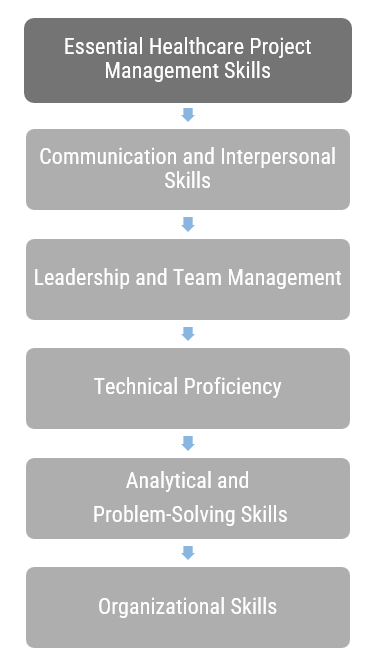
Leadership and Team Management
Motivation and Guidance: Effective leadership is at the heart of successful healthcare project management. HPMs must inspire and guide their teams, fostering a collaborative environment where every member feels valued and motivated to contribute to the project’s success. This involves setting clear expectations, providing regular feedback, and recognizing team achievements.
Conflict Resolution: In a multidisciplinary team, conflicts are inevitable. HPMs must be adept at identifying and resolving conflicts quickly and efficiently. This requires strong interpersonal skills, the ability to mediate disputes, and the capability to find mutually beneficial solutions that keep the project on track.
Technical Proficiency
Healthcare Knowledge: A deep understanding of healthcare processes, regulations, and technologies is essential. HPMs need to be familiar with clinical workflows, healthcare compliance standards, and the latest advancements in medical technology. This knowledge allows them to make informed decisions and ensure that projects align with industry standards and best practices.
Project Management Software: Proficiency in project management tools like MS Project, Asana, or Trello is crucial for tracking project progress, managing resources, and ensuring that tasks are completed on time. HPMs use these tools to create detailed project plans, monitor performance, and communicate effectively with their teams.
Communication and Interpersonal Skills
Stakeholder Communication: Effective communication with all stakeholders, including clinicians, administrators, and patients, is vital. HPMs must convey complex information clearly and concisely, tailor their communication style to different audiences, and ensure that everyone is informed and engaged throughout the project lifecycle.
Negotiation: Negotiating with vendors, suppliers, and stakeholders is a key aspect of the HPM’s role. Whether securing the best prices for materials or gaining stakeholder buy-in for project changes, strong negotiation skills help HPMs achieve favorable outcomes and keep the project moving forward.
Analytical and Problem-Solving Skills
Data Analysis: Analyzing data to make informed decisions and improve project outcomes is a critical skill for HPMs. They must be able to interpret complex data sets, identify trends, and use this information to guide project planning and execution.
Problem-Solving: Quickly identifying and addressing issues that arise during the project lifecycle is essential. HPMs need to think critically, anticipate potential problems, and develop effective solutions to keep the project on track and avoid delays or setbacks.
Organizational Skills
Time Management: Prioritizing tasks and managing time effectively is crucial for keeping the project on schedule. HPMs must be able to juggle multiple tasks, set realistic deadlines, and ensure that team members stay focused and productive.
Detail Orientation: Ensuring meticulous attention to detail helps prevent errors and oversights. HPMs must review project plans, monitor progress, and double-check deliverables to ensure that everything meets the required standards and specifications.
By mastering these skills, healthcare project managers can lead their teams to success, navigate the unique challenges of the healthcare industry, and deliver projects that enhance patient outcomes and operational efficiency.
Challenges in Healthcare Project Management
Despite the rewarding nature of their work, a healthcare project manager faces several unique challenges. These challenges require them to be adaptable, resourceful, and proactive in finding solutions to ensure project success.

Regulatory Compliance
Complex Regulations: The healthcare industry is governed by a myriad of regulations and standards, including HIPAA, FDA guidelines, and CMS requirements. HPMs must navigate these complex regulatory landscapes, ensuring that all project activities comply with current laws and standards. Staying updated with regulatory changes and understanding their implications on projects is a continuous challenge.
Compliance Risks: Non-compliance can lead to severe legal and financial repercussions, including fines and sanctions. HPMs must implement robust compliance checks and balance to mitigate these risks. This involves regular audits, thorough documentation, and collaboration with legal and compliance teams to ensure all aspects of the project adhere to relevant regulations.
Resource Constraints
Budget Limitations: Healthcare projects often operate within tight budgets, which can limit the scope and quality of deliverables. HPMs must be skilled in fiscal management, finding cost-effective solutions without compromising the project’s goals. This requires careful planning, prioritizing essential tasks, and seeking additional funding or grants when necessary.
Staff Shortages: The healthcare industry frequently faces staffing challenges, including shortages of qualified personnel and high turnover rates. HPMs must manage projects effectively amidst these constraints, ensuring that all roles are adequately filled, and that staff are not overburdened. This may involve cross-training team members, optimizing schedules, and leveraging temporary staff or consultants.
Technological Integration
Interoperability Issues: Integrating new technologies with existing systems can be problematic, particularly in healthcare settings where legacy systems are common. HPMs must ensure that new technologies are compatible, and that data can be seamlessly shared across platforms. This requires close collaboration with IT teams, thorough testing, and contingency planning to address any integration issues.
Training Needs: Implementing new technologies often necessitates training for healthcare professionals. HPMs must develop and execute comprehensive training programs to ensure all team members are proficient with the new systems. This includes creating user manuals, organizing workshops, and providing ongoing support to address any questions or challenges that arise.
Stakeholder Management
Diverse Interests: Balancing the diverse interests and expectations of various stakeholders can be challenging. Stakeholders in healthcare projects can include clinicians, administrators, patients, vendors, and regulatory bodies, each with their own priorities and concerns. HPMs must navigate these interests, finding common ground and ensuring that all voices are heard and considered in decision-making processes.
Change Resistance: Resistance to change is a common challenge in healthcare projects. Healthcare professionals accustomed to established practices may be hesitant to adopt new processes or technologies. HPMs must address this resistance through effective change management strategies, including clear communication, demonstrating the benefits of the change, and involving stakeholders in the planning and implementation phases.
Patient-Centered Focus
Quality of Care: Ensuring that projects enhance patient care without disrupting existing services is paramount. A healthcare project manager must carefully plan and execute projects to avoid negative impacts on patient care, such as scheduling disruptions, reduced availability of services, or increased wait times. This involves detailed planning, stakeholder engagement, and continuous monitoring to mitigate any adverse effects.
Patient Privacy: Maintaining patient privacy and data security throughout the project lifecycle is a critical concern. HPMs must implement stringent data protection measures, comply with privacy regulations like HIPAA, and ensure that all team members are trained in data security protocols. This includes using secure communication channels, encrypting sensitive data, and conducting regular security audits.
By understanding and addressing these challenges, a healthcare project manager can navigate the complexities of the healthcare industry, ensuring that projects are delivered successfully, on time, and within budget, enhancing patient outcomes and operational efficiency.
Best Practices in Healthcare Project Management
To overcome the challenges and drive successful projects, a healthcare project manager can adopt several best practices. These practices help ensure that projects are completed efficiently, meet their objectives, and deliver tangible benefits.
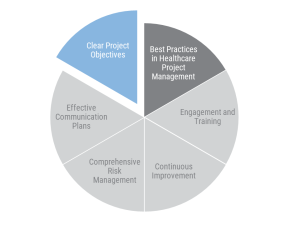
Clear Project Objectives
SMART Goals: Setting Specific, Measurable, Achievable, Relevant, and Time-bound (SMART) goals is essential. These well-defined goals provide a clear direction and framework for the project, ensuring that all team members understand what needs to be accomplished and by when.
Stakeholder Alignment: Ensuring that all stakeholders agree on the project’s objectives and goals is crucial. This alignment fosters a sense of shared purpose and commitment, facilitating smoother collaboration and decision-making. Regular meetings and updates help maintain this alignment throughout the project.
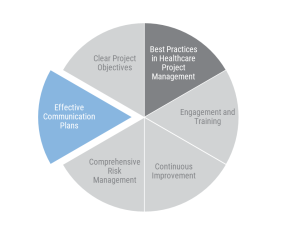
Effective Communication Plans
Regular Updates: Scheduling regular updates and meetings keeps everyone informed and engaged. These updates provide opportunities to discuss progress, address challenges, and make necessary adjustments. Utilizing project management tools for real-time communication can enhance transparency and accountability.
Transparent Communication: Fostering a culture of transparency and openness helps build trust among team members and stakeholders. HPMs should encourage open dialogue, where team members feel comfortable sharing their ideas, concerns, and feedback. This approach can lead to more innovative solutions and improved project outcomes.
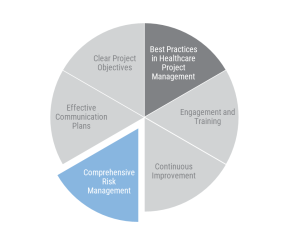
Comprehensive Risk Management
Proactive Risk Identification: Identifying potential risks early in the project is essential for mitigating their impact. HPMs should conduct thorough risk assessments, considering all aspects of the project, from technical challenges to stakeholder resistance. This proactive approach allows for the development of effective risk mitigation strategies.
Contingency Plans: Developing contingency plans for high-priority risks ensures that the project can continue smoothly in the face of unexpected challenges. These plans should outline specific actions to take if certain risks materialize, providing a clear roadmap for maintaining project momentum.
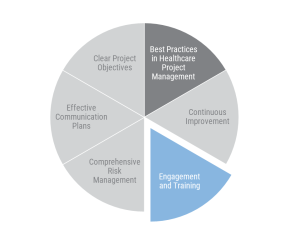
Engagement and Training
Stakeholder Engagement: Engaging stakeholders throughout the project is key to gaining their support and input. This engagement can be achieved through regular meetings, updates, and opportunities for stakeholders to provide feedback. By involving stakeholders in decision-making processes, HPMs can foster a sense of ownership and commitment to the project’s success.
Training Programs: Implementing comprehensive training programs ensures that all team members are well-prepared to perform their roles effectively. Training should cover new technologies, processes, and any other skills required for the project. Continuous learning opportunities can help keep the team up to date with industry advancements and best practices.
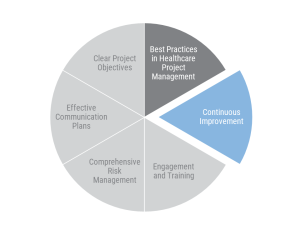
Continuous Improvement
Feedback Loops: Creating feedback loops to continuously gather and act on feedback is crucial for ongoing improvement. HPMs should establish mechanisms for collecting feedback from team members and stakeholders, such as surveys, meetings, and informal discussions. This feedback can provide valuable insights for refining project processes and enhancing outcomes.
Post-Project Reviews: Conducting post-project reviews to identify lessons learned and areas for improvement is a crucial step in the project lifecycle. These reviews should evaluate what went well, what could have been done better, and how similar projects can be improved in the future. Documenting these findings can help build a knowledge base for future projects.
By adopting these best practices, healthcare project managers can enhance their ability to deliver successful projects that meet objectives, stay within budget, and improve patient outcomes and operational efficiency. These practices also contribute to a culture of continuous improvement, where each project becomes an opportunity to learn and grow.
John Lynch and Associates’ Healthcare Project Managers
At John Lynch and Associates, our healthcare project managers are dedicated to delivering high-impact projects that enhance patient outcomes and operational efficiency. Our team brings a wealth of experience, deep industry knowledge, and a commitment to excellence.

Expertise in Healthcare Projects
Diverse Experience: Our project managers have led various healthcare projects, from EHR (Electronic Health Records) implementations to process improvements and facility upgrades. This diverse experience enables us to tackle a wide range of challenges and deliver tailored solutions that meet the specific needs of our clients.
Proven Track Record: We have a proven record of accomplishment of successfully delivering complex healthcare projects on time and within budget. Our success stories include implementing new healthcare technologies, streamlining administrative processes, and improving patient care services.
Customized Solutions
Tailored Approaches: At John Lynch and Associates, we understand that every healthcare organization is unique. We customize our project management approaches to meet the specific needs and goals of each client. This personalized approach ensures that our solutions are aligned with our clients’ strategic objectives and operational requirements.
Innovative Strategies: We leverage innovative strategies and best practices to drive project success. Our team stays updated with the latest industry trends and technologies, ensuring that we can offer innovative solutions that enhance efficiency and improve patient outcomes.
Comprehensive Support
End-to-End Services: We offer end-to-end project management services, from initial planning to final delivery and evaluation. Our comprehensive approach covers all aspects of project management, including scope definition, resource allocation, risk management, and quality assurance.
Continuous Improvement: We continuously strive to improve our processes and deliver better outcomes for our clients. By conducting post-project reviews and gathering feedback, we identify areas for improvement and implement changes to enhance future projects.
Commitment to Excellence
Client-Centered Focus: Our healthcare project managers are committed to delivering exceptional results for our clients. We prioritize our clients’ needs and work closely with them to ensure their projects are successful. This client-centered focus has earned us a reputation for reliability and excellence in the healthcare industry.
Quality Assurance: Quality is at the forefront of everything we do. We implement rigorous quality assurance measures to ensure that our projects meet the highest standards. From compliance with healthcare regulations to adherence to best practices, we leave no stone unturned in our quest for excellence.
By partnering with John Lynch and Associates, healthcare organizations can ensure their projects are managed effectively, delivering tangible benefits, and driving improvements in patient care and operational efficiency. Our team of dedicated healthcare project managers is ready to tackle the most complex challenges and deliver solutions that make a difference.
Conclusion
Healthcare project managers play a critical role in driving successful healthcare projects. They navigate unique challenges, leverage specialized skills, and adopt best practices to ensure projects meet their objectives and enhance patient outcomes.
At John Lynch and Associates, our healthcare project managers are committed to excellence, delivering customized solutions that meet the unique needs of each client and drive meaningful improvements in the healthcare industry.
By understanding the roles, skills, challenges, and best practices in healthcare project management, we can appreciate the significant contributions these professionals make to the healthcare industry.
Whether it is improving patient care, streamlining operations, or implementing new technologies, healthcare project managers are essential to the success of healthcare projects.
